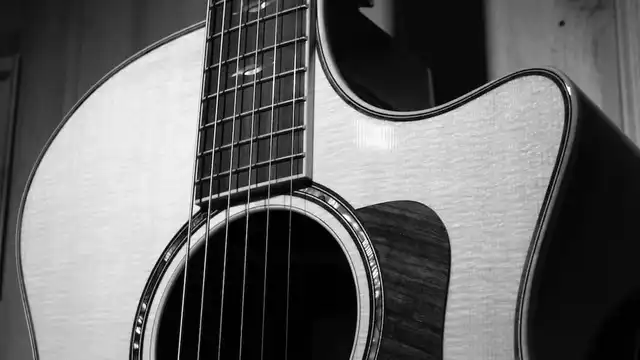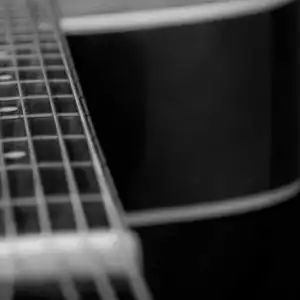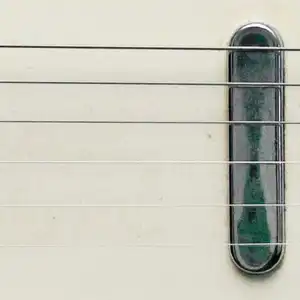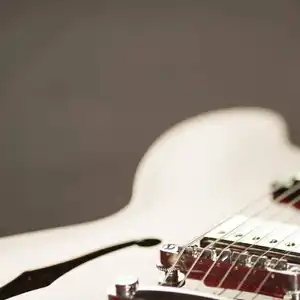What Do Electric Guitar Strings Sound Like on Acoustic Guitar?


Be sure to subscribe to our YouTube channel to keep up with more great videos like this one:

Transcription
A little while back, we did a video where we put acoustic guitar strings on an electric guitar. We showed what it sounded like, which was not the best thing in the world, and we talked about why it's not such a good idea. Well, after we did that video we had a lot of people ask us if we did the opposite, so taking electric guitar strings and putting them on an acoustic guitar. Well, today, we're going to answer that question. We have this little Fender FA135-CE acoustic guitar. We have the stock strings, which are an 80/20 bronze that came on it, and we're gonna compare those strings, first off, with just a regular set of Electric 10s, and after that, we're gonna pick pretty similar gauges to what's probably on here right now, but out of electric guitar strings, and compare the sound of the two when it's just the gauges being the same and only the alloy being different. So, let's dive in and see what everything sounds like. All right, so let's see what the guitar sounds like right now with an 80/20 set. As far as I can tell, these are 11s, that's what they feel like. I haven't calipered them out just yet, but I have a pretty good feel for these things after doing it for a long, long time. So, anyway. Let's see what it sounds like. All right, now through the magic of television, or YouTube, as it were, we have a set of Balance 10s here on the same guitar. This is our Balanced Light Gauge Set for electric guitar, so it goes 10, 13.5, 17, 26, 36, and 48 down on the low E. Considerably lighter than what you typically see for acoustic guitar. I know it's gonna be really, really playable, but let's take a look and see what it sounds like. So as you could tell, it doesn't sound all that bad. It's definitely a lighter gauge than what we would typically would see and that has a effects on things. First of all, I can at least hear the strings interacting with the frets a little bit more than they would on a heavier gauge typical acoustic set, gives it sort of a snappiness to it, that really varies on your preference whether you like it or not. Volume is definitely decreased. A lot of that's from the alloy and a lot of that is from the lighter gauge all around. But overall, it doesn't sound as bad as it could. I think a lot of that has to do with the 48 at the bottom end of our balance set being a little bit less floppy than you'd typically see a 46 would be there. But nonetheless, it doesn't sound too bad! All right, now that we've had a chance to compare a typical set of electric guitar strings with an acoustic guitar string set both on an acoustic guitar. I want to make one more string change and try out one more possibility. What I want to do is take electric guitar strings but use a set that's gauged very similarly to what we would typically see acoustic guitar strings gauged like, so that means a wound third, heavier strings all around. That way, we can compare just how the alloys sound on the wound strings without having to worry about anything like gauges which can really affect the tonality of a guitar. This way, it'll be a lot more of an apples to apples comparison. All right, so for our final experiment, we put a guitar string set onto this acoustic that are the same gauges as our light acoustic guitar strings, however, they're out of nickel electric strings. So, we've got a 12, a 16, a 24, of course a wound third like a typical acoustic guitar string set would have, a 32, a 42, and a 54 rounds us out. Quite a bit more heavy in terms of gauges than our last set was. Let's give it a listen and see what it sounds like. I don't know what that sounded like to you at home, but for me here sitting in the room, I can tell you that that electric set we used had a lot more power, a lot more fullness, a lot more body than the first of the electric sets that we used. And that's understandable. It had what you'd typically expect in terms of gauges out of an acoustic guitar, so a lot heavier strings overall. Had the wound third that we're typically used to, a little bit heavier on the bottom as well, and that made a really big difference in terms of getting that authentic, sort of acoustic full-bodied sound that at least I'm used to when I'm listening to an acoustic guitar. The truth is, electric guitar strings will work just fine on an acoustic. There's no reason that nickel guitar strings are any better or worse than 80/20 bronze acoustic guitar strings or phosphor bronze acoustic guitar strings. It's just a different feel. I think the trouble is that most people that have ever tried electric guitar strings on an acoustic guitar have probably just taken a set of nines or a set of 10s and strung 'em up out of desperation or not knowing better, and obviously, I don't think those are going to give you that fullness you really want out of your acoustic. With the right gauges, however, I think acoustic guitars can really, really benefit from nickel electric strings. It's a particular sort of sound, but I think one that's really good. It gives you a really warm, sort of woody, full-bodied tone. I would say it's even a bit warmer than phosphor bronze, but at the same time, there's a little bit of sparkle to it that's hard to put my finger on. One advantage you get when you get when you use nickel guitar strings on an acoustic guitar is that you get a lot more longevity out of your strings typically. Nickel is a lot more resistant to tarnishing or corrosion and things like that, than copper is, copper, of course, being the largest constituent part of 80/20 bronze or phosphor bronze. Phosphor bronze is better than 80/20 bronze for reasons we'll get into for another video, but generally, nickel tends to outlast both of them. So, nickel-plated steel strings like these, if you get them in the right gauges and pop 'em on your acoustic guitar, if you're comfortable with that sort of warm, woody sound that they'll give you, they'll give it to you for a long time without really having a lot of trouble. One piece of advice I will give you if you look to customize a set like this is I would recommend going slightly lighter in gauge on the top two plain strings than you would typically see in a corresponding, regular phosphor bronze or 80/20 acoustic set. For example, on this guitar, I think an 11.5 and a 15 on the top two strings would work really nicely. Right now, it's a 12 and a 16. It works just fine, they just have a little bit more output than the wound strings, to my ears. Again, that might just be me. Your results may vary, but I would at least consider it, just because you have that warmer tone, a little less output from the nickel ... you might need to make an adjustment on the plain steel strings to help everything balance out just right. One final note: A lot of people will ask us over email about nickel/bronze strings. Nickel/bronze strings are basically the wrap-wire of the string is bronze on the inside and it's coated with nickel on the outside. This gives you a little bit of the projection of bronze with more of that tone and longevity of nickel. A lot of people will think that you have to use nickel/bronze strings on an acoustic guitar, because for some reason, you just have to have bronze on the acoustic guitar, or I don't know, the world will explode. It's just not really true, though. Regular nickel electric guitar strings will work really, really well on an acoustic. You have steel as the inside of that wrap-wire on these, and that's not necessarily any less bright or projects any worse than bronze does. So, I wouldn't necessarily suggest that nickel bronze is what you have to do if you want a nickel-vibe on your acoustic strings. It might be the flavor for you, but overall, I think it's a little bit more hype and marketing than really an overall differentiator between regular nickel-plated steel strings like these. So, if you want to try a set of nickel-plated steel strings on your acoustic guitar, I would just recommend finding the right gauges for you. You might have to experiment a little bit there to find out what works really well for your particular guitar and your particular style. But after you find it, I think it's a very worthwhile investment and you might really, really like it. We make it easy to customize any of our sets of strings. Here on our site, you can simply select any of our electric gauges, completely customize the set to more mirror the acoustic gauges that you're used to, or you can totally recreate something from scratch that feels like it'll work really well for you. What do you think? Have you ever put a set of electric guitar strings on your acoustic guitar? Were you using a set of nines or a set of 10s or something more gauged for an acoustic? Let us know what you thought about it down in the comments.Other Posts you may like

Guitar Strings Order: How the Guitar is Tuned and Why

Two Handed Tapping: Our Top 8 Tappers of All Time

Which Guitar Strings Wear Your Fret Wire Down More?

What is Nashville Tuning? Its History, Best Guitar Strings & Uses

Guitar Scale Length Explained: String Tension & Playability

What Guitar Strings I Used To Play...
0 Responses
Leave a Reply
Your email address will not be published. Required fields are marked *

